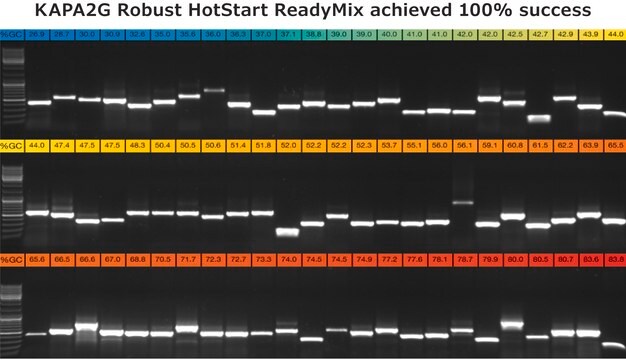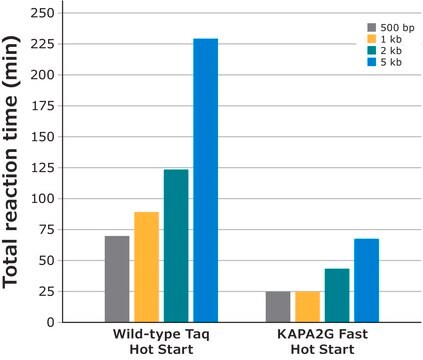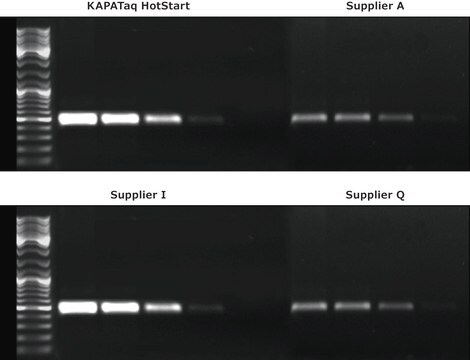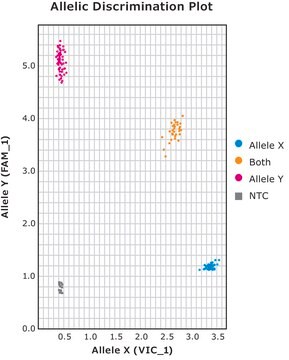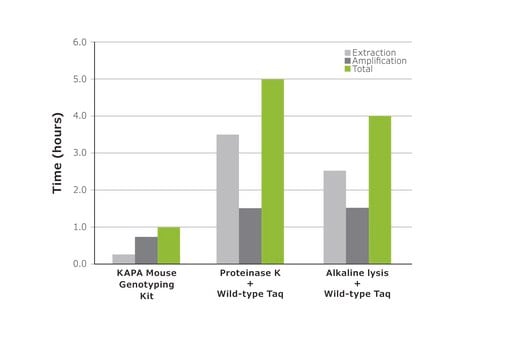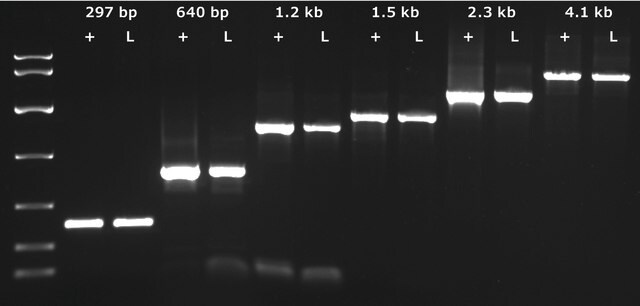2GRHSRMKB
Roche
KAPA2G Robust HotStart ReadyMix
2 × ( contains 2 mM MgCl2 at 1×)
Synonym(s):
PCR, hotstart PCR
About This Item
Recommended Products
usage
sufficient for 100 reactions
sufficient for 500 reactions
Quality Level
shelf life
≤12 mo.
feature
Difficult Templates/Specialty Enzymes PCR
dNTPs included
hotstart
packaging
kit of 1.25 mL (100 x 25 μL rxn; KK5701)
kit of 6.25 mL (500 x 25 μL rxn; KK5702)
manufacturer/tradename
Roche
concentration
2 × ( contains 2 mM MgCl2 at 1×)
technique(s)
PCR: suitable
input
crude DNA
storage temp.
−20°C
Looking for similar products? Visit Product Comparison Guide
General description
Application
- amplification of GC- or AT-rich templates
- aplification of templates containing common polymerase chain reaction (PCR) inhibitors e.g. salts, urea, SDS, or ethanol
- crude sample PCR e.g. buccal swabs, cultured mammalian, yeast, or bacterial cells
- colony PCR
- DNA extraction and amplification
- mutation screening
- methylation-specific PCR (MSP) amplification
- genotyping-PCR
- PCR-based sequencing
Biochem/physiol Actions
Features and Benefits
- Robust performance across a wide range of GC- and AT-rich templates
- Increased PCR success rates
Improved tolerance to common PCR inhibitors
- Efficient amplification from crude samples
- Higher yield and sensitivity per unit of enzyme
Unrivalled performance in colony PCR
- Higher yields and improved consistency of PCR direct from E. coli and yeast cells
Quick Notes:
- KAPA2G Robust HotStart ReadyMix PCR Kits contain KAPA2G Robust DNA Polymerase, engineered for high processivity and inhibitor tolerance.
- Both purified genomic DNA and crude samples (e.g. colony PCR) can be used as template.
- Use 15 sec/kb extension time per cycle, and increase to 30-60 sec/kb for difficult amplicons or templates.
- KAPA2G Robust HotStart ReadyMix contains 2 mM MgCl2 at 1X.
- KAPA2G Robust HotStart ReadyMix with dye includes two inert tracking dyes to allow direct loading onto agarose gels.
- KAPA2G Robust HotStart ReadyMix is ideal for single-protocol PCR, i.e. amplification of fragments varying from 25–65% GC, up to 1 kb in size, using a single reaction setup and cycling protocol.
- Reaction products are 3′-dA-tailed and may be cloned into TA cloning vectors.
Quality
Preparation Note
Other Notes
Legal Information
Kit Components Only
- KAPA2G Robust HotStart® DNA Polymerase 1U per 25 µL reaction
- MgCl2 2mM at 1X
- dNTP Mix 0.2 mM of each dNTP at 1X
Signal Word
Warning
Hazard Statements
Precautionary Statements
Hazard Classifications
Acute Tox. 4 Oral - STOT SE 2
Storage Class Code
12 - Non Combustible Liquids
WGK
WGK 1
Flash Point(F)
does not flash
Flash Point(C)
does not flash
Certificates of Analysis (COA)
Search for Certificates of Analysis (COA) by entering the products Lot/Batch Number. Lot and Batch Numbers can be found on a product’s label following the words ‘Lot’ or ‘Batch’.
Already Own This Product?
Find documentation for the products that you have recently purchased in the Document Library.
Customers Also Viewed
Articles
An overview of directed evolution and the methods for generating proteins with optimized or entirely new functions.
Our team of scientists has experience in all areas of research including Life Science, Material Science, Chemical Synthesis, Chromatography, Analytical and many others.
Contact Technical Service